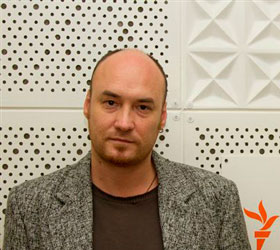Valiantsin Stefanovich: “The Belarusian authorities have not demonstrated a positive trend in implementing the EU conditions”
Valiantsin Stefanovich, Deputy Head of the Human Rights Center “Viasna”, does not share the optimism of the European Parliament’s Rapporteur on Belarus Justas Paleckis, who argues that the human rights situation in the country has improved recently, said he in an interview to the Interfax-West news agency.
“Intensive contacts have been underway since last December, but today is May and the Belarusian authorities have not demonstrated a positive trend in implementing the conditions of the EU, there is no change,” says the human rights defender.
Moreover, he noted that “Lukashenka clearly reiterates his stance on political prisoners: those who wished wrote a petition for pardon and were released. For him, this is a question of principle, and he does not agree to any compromise.” However, according to Valiantsin Stefanovich, the issue of political prisoners is question number one in the EU. “It’s very difficult to it get around or avoid it. We all want to see these people released, but, by and large, globally their release does not change anything. The situation remains the same, we should not wait any systemic changes in legislation and practice,” says Viasna’s deputy head.
He does not share the optimism of the European Parliament’s Rapporteur Justas Paleckis. “Of course, if we compare the situation in 2012 with that of 2011, when the country was hit by a conveyor of trials after December 2010, when dozens political prisoners appeared in the country, it is different. But the situation has to be evaluated in a complex and balanced approach to these issues, because there were no major changes either in 2012 or in 2013. On the contrary, in the past year, we witnessed the introduction of restrictions on leaving the country for political reasons imposed on two dozen people,” says the human rights activist.
According to him, “when reports on human rights issues are written by politicians, then they are at risk of rolling in one direction or another depending on the objectives and the political situation.” Viasna’s representative views Paleckis’ report as “the EU’s attempt to establish a dialogue with Minsk.” "My contacts with the EU representatives suggest that people are reasonable in assessing the essence of the policies and actions of the Belarusian authorities. It is unlikely that they are aiming to teach Minsk democracy. Rather, their challenge is to minimize the effects of repression, to release political prisoners,” says Valianstin Stefanovich.
“We should not expect more. The next presidential election will be held in 2015, and, in my opinion, for Lukashenka it would be unreasonable to allow some kind of significant liberalization,” believes the deputy head of the Human Rights Center “Viasna”.
In his report prepared for the European institutions, Justas Paleckis suggests considering “the suspension of EU sanctions against key Belarusian officials with a view to broadening the main and essential diplomatic communication channel with Belarus, also in view of the Eastern Partnership summit.”
The Rapporteur recommends the use of Lithuania’s EU presidency in the latter half of 2013 and the Eastern Partnership summit in Vilnius as “unique opportunities to improve relations with Belarus, including with a view to restarting the political dialogue on, inter alia, democratic reforms and respect for the rule of law, human rights and fundamental freedoms.”
The report’s author also considers it necessary to draw up a strategic roadmap for Belarus, which will include proposals on priority directions of the country’s reform and proposals for enhanced political dialogue. Mr. Paleckis believes that in the future this may lead to a resumption of negotiations on a new comprehensive agreement. In addition, he recommends to intensify contacts with Belarusian officials in order to “foster openness of mind towards the EU and to enhance EU-Belarus cooperation.”


















